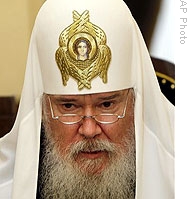-
(单词翻译:双击或拖选)
 |
| Russian Pres. Medvedev (L), and Indian Prime Minister Singh shake hands in New Delhi, 05 Dec 2008 |
The agreement to build four new nuclear energy reactors in the southern state of Tamil Nadu was concluded Friday after Russian President Dmitri Medvedev held talks with Indian Prime Minister Manmohan Singh in New Delhi.
Russia is the third country to sign an atomic energy agreement with India after the Nuclear Suppliers Group lifted a ban on trade of nuclear technology with New Delhi in September. India has concluded similar accords with France and the United States.
The Russian president came for a two-day visit to India a week after the Indian business hub of Mumbai was devastated3 by coordinated4 terror strikes.
At a news conference with the Russian leader, Mr. Singh said India was hurt and angry as never before by the terror attacks, and called for greater international cooperation in the fight against terror.
"I conveyed to President Medvedev the sense of anger and outrage5 in India over the terrorist attacks in Mumbai. We deeply appreciate Russia's expression of solidarity6 with India at this moment. We both agreed that these attacks represent a threat to all open and pluralistic societies, and require a major intensification7 of efforts against supporters and terrorism anywhere in the world," he said.
On top of the Russian leader's agenda was increasing defense8 cooperation with India. Moscow has traditionally been the main supplier of defense equipment to India, but it has been facing competition from countries like Israel and the United States in recent years .
Mr. Singh said India will continue to have strong defense links with Russia.
"We have agreed to further strengthen our defense cooperation by increasingly focusing on joint9 production and research and development," he said.
 |
| Russian Orthodox Patriarch Alexei II, 29 Oct 2008 file photo |
New Delhi and Moscow, signed ten accords in areas ranging from tourism to trade. These include stepping up cooperation in space exploration. Russia will send an Indian cosmonaut into space in 2013 and launch a manned Indian spacecraft in 2015. Both countries also want to increase bilateral10 trade to $10 billion by 2010.
The Russian leader cancelled plans to visit Italy after his visit to India, and decided11 to return to Moscow due to the death of the Russian Orthodox Patriach Alexei II.
 收听单词发音
收听单词发音
1
civilian

|
|
| adj.平民的,民用的,民众的 | |
参考例句: |
|
|
|
2
reactors

|
|
| 起反应的人( reactor的名词复数 ); 反应装置; 原子炉; 核反应堆 | |
参考例句: |
|
|
|
3
devastated

|
|
| v.彻底破坏( devastate的过去式和过去分词);摧毁;毁灭;在感情上(精神上、财务上等)压垮adj.毁坏的;极为震惊的 | |
参考例句: |
|
|
|
4
coordinated

|
|
| adj.协调的 | |
参考例句: |
|
|
|
5
outrage

|
|
| n.暴行,侮辱,愤怒;vt.凌辱,激怒 | |
参考例句: |
|
|
|
6
solidarity

|
|
| n.团结;休戚相关 | |
参考例句: |
|
|
|
7
intensification

|
|
| n.激烈化,增强明暗度;加厚 | |
参考例句: |
|
|
|
8
defense

|
|
| n.防御,保卫;[pl.]防务工事;辩护,答辩 | |
参考例句: |
|
|
|
9
joint

|
|
| adj.联合的,共同的;n.关节,接合处;v.连接,贴合 | |
参考例句: |
|
|
|
10
bilateral

|
|
| adj.双方的,两边的,两侧的 | |
参考例句: |
|
|
|
11
decided

|
|
| adj.决定了的,坚决的;明显的,明确的 | |
参考例句: |
|
|
|















